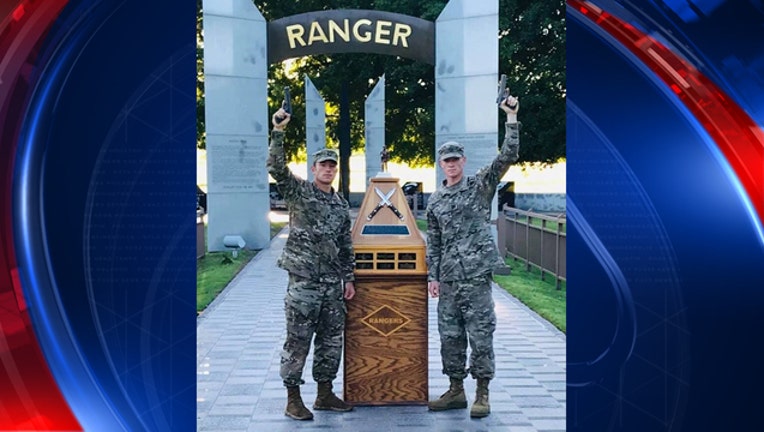Tough going: Elite service members compete for 'Best Ranger'

(Courtesy: Best Ranger Competition / Facebook)
FORT BENNING, Ga. (AP) - There's tough, there's Army Ranger tough and then there's the toughest of the tough, the handful named Best Ranger.
Earlier this month, 106 elite members of the U.S. military spent 60 grueling hours competing as two-member teams for the Best Ranger title. Sleep-deprived and sometimes soaking wet and loaded down with gear, they marched, ran, swam, rappelled and swung hand over hand on ropes across a wilderness area at Fort Benning in western Georgia while firing rifles and machine guns, performing simulated combat rescues, navigating at night and tackling other daunting, back-to-back challenges.
In the end, Capts. John Bergman and Michael Rose of the Army's 101st Airborne Division crossed the finish line with rifles raised over their heads - Rose for his third time winning the endurance challenge and Bergman for his second.
Fort Benning, host of the annual competition, is home to the Army's elite 75th Ranger Regiment as well as the demanding Army Ranger School. Just to become a Ranger entails some of the Army's toughest training in a 61-day course that weeds out roughly half of those who enter.
Rose, 28, from Roswell, Georgia, was among the soldiers who didn't graduate from Ranger training on his first try. They call it being "recycled."
Undaunted, he tried again, passed and returned less than a year later with Bergman to compete for Best Ranger. Rose said he wanted to prove that a soldier can spring back into fighting form just months after completing Ranger training.
"We managed to win," he said.
The Best Ranger Competition began in 1982 as a contest reserved for Army troops serving in elite special operations units. It aims to put "extreme demands on each buddy team's physical, mental, technical and tactical skills as Rangers."
Changes over more than three decades have opened up the competition to others across all branches of the U.S. military who meet Ranger standards.
This year's competition kicked off before sunrise April 12 with a 5 mile (8 kilometer) run, an obstacle course, a challenge carrying a weighted down stretcher, a swim, a run wearing body armor, an urban assault course, a shooting test at a firing range and a nighttime foot march.
And that was just the first day out of three.
The next day saw the teams narrowed by half. Competitors tested their skills at climbing and rappelling off towers, as well as rescuing and treating an injured comrade from a downed helicopter. After dark they were airlifted into the mountains to compete in wilderness navigation.
Some events were canceled in the final round on the third day as heavy thunderstorms with a chance of tornadoes moved into the Fort Benning area. Teams were still able to face off in a 2 mile (3.2 kilometer) run dotted with barbed wire and other obstacles, plus a combat water skills challenge involving tower climbing, crawling along a rope and zip-lining into a pond.
In a telephone interview the day after it all ended, the two winners said they had been training for months, building up to where they were going 100 miles a week on foot, running or marching, plus weightlifting. Their military units gave them plenty of leeway. So did the families of the two young fathers.
"The families have a lot of sacrifices as well," said Bergman.
Rose said his inspiration to keep competing comes from "just representing our unit as best we can and kind of inspiring younger soldiers and showing 'em what we're capable of - what the Rangers are capable of over the course of three days."
Bergman, 29, who grew up in Lawrence, Kansas, added that as they prepare to become company commanders, both officers want to instill that message in the soldiers under their charge: "No matter what you achieve, there's always something else greater that you can become."

